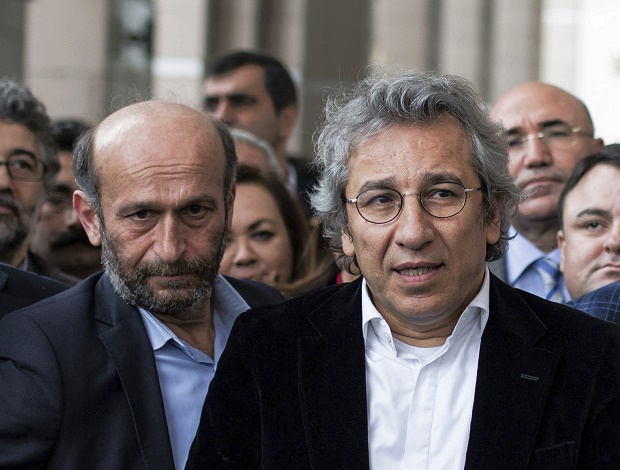
In this Thursday, Nov. 26, 2015 photo, Can Dundar, right, the editor-in-chief of opposition newspaper Cumhuriyet, and Erdem Gul, left, the paper’s Ankara representative, speak to the media outside a courthouse in Istanbul, Turkey. In new blow to media freedoms in Turkey, a court on Thursday ordered the two prominent opposition journalists jailed pending trial over charges of willingly aiding an armed group and of espionage for revealing state secrets for their reports on alleged arms smuggling to Syria. In May, the Cumhuriyet paper published what it said were images of Turkish trucks carrying ammunition to Syrian militants. AP
ISTANBUL, Turkey — Two Turkish journalists charged with “spying” over their reports about Ankara’s alleged arms supplies to Syrian rebels urged the EU on Saturday not to compromise on human rights and press freedom as it looks to Turkey to help stem Europe’s migrant crisis.
European Union and Turkish leaders including Prime Minister Ahmet Davutoglu will meet in Brussels on Sunday in a bid to complete a deal aimed at stemming the flow of refugees from Syria into the bloc.
Turkey hosts more than two million Syrian refugees and is the main gateway for people trying to get to the EU, via the short sea crossing to the Greek islands.
Writing from the Silivri prison near Istanbul, the opposition Cumhuriyet daily’s editor-in-chief Can Dundar and Ankara bureau chief Erdem Gul said they hoped the meeting would produce a lasting solution to the crisis “that has concerned and touched all our hearts.”
READ: Hundreds protest jailing of 2 journalists in Turkey
But they added: “We would also hope that your desire to end the crisis will not stand in the way of your sensitivity towards human rights, freedom of press and expression as fundamental values of the Western world.”
“The Prime Minister of Turkey, whom you will meet this weekend, and the regime he represents are well known for policies and practices that have flouted human rights and freedom of the press,” they said.
The letter was addressed to EU leaders as well as German Chancellor Angela Merkel, French President Francois Hollande and the British Prime Minister David Cameron.
Ankara is negotiating with the EU an action plan envisaging Turkey preventing refugees from leaving for the EU, in exchange for financial aid, visa liberalisation for Turkish citizens and boosting Ankara’s bid to join the bloc.
Turkey itself is sheltering over two million Syrian refugees.
A court in Istanbul on Thursday arrested Dundar and Gul for spying over the publication of footage from January 2014 purporting to show Turkey’s secret services helping send weapons to Islamist rebels in Syria.
They face up to 45 years in jail if convicted.
The revelations, published in May, caused a political storm in Turkey, with an enraged President Recep Tayyip Erdogan vowing Dundar would pay a “heavy price”.
There has been growing concern about deteriorating press freedoms in Turkey under Erdogan and in particular over the numbers of journalists facing legal proceedings on accusations of insulting or criticising top officials.